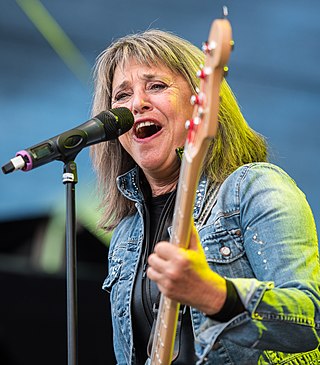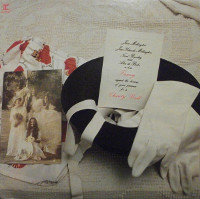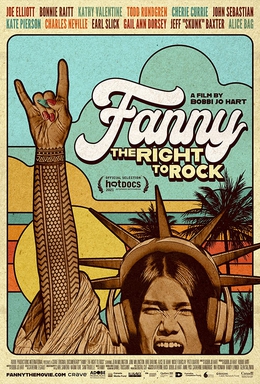
Susan Kay Quatro is an American singer, bass guitarist, songwriter and actor. In the 1970s, she scored a string of singles that found success in Europe and Australia, with both "Can the Can" (1973) and "Devil Gate Drive" (1974) reaching No. 1 in several countries.

Cherie Ann Currie is an American singer, musician, actress and artist. Currie was the lead vocalist of The Runaways, a rock band from Los Angeles, in the mid-to-late 1970s. She later became a solo artist. Currie and her identical twin sister, Marie Currie, released the album Messin' with the Boys in 1980 as Cherie & Marie Currie. Their duet "Since You Been Gone" reached number 95 on US charts. She is also known for her role in the movie Foxes.
An all-female band is a musical group in popular music that is exclusively composed of female musicians. This is distinct from a girl group, in which the female members are solely vocalists, though this terminology is not universally followed. While all-male bands are common in many rock and pop scenes, all-female bands are less common.

A New World Record is the sixth studio album by Electric Light Orchestra (ELO). It was released on 15 October 1976 on United Artists Records in the U.S., and on 19 November 1976 on Jet Records in the United Kingdom. A New World Record marked ELO's shift towards shorter pop songs, a trend which would continue across their career.

Tin Machine were a British–American rock band formed in 1988. The band consisted of English singer-songwriter David Bowie on lead vocals, saxophone and guitar; Reeves Gabrels on guitar and vocals; Tony Fox Sales on bass and vocals; and Hunt Sales on drums and vocals. The Sales brothers had previously performed with Bowie and Iggy Pop during the 1977 tour for The Idiot. Kevin Armstrong played additional guitar and keyboards on the band's first and second studio albums and first tour, and American guitarist Eric Schermerhorn played on the second tour and live album Tin Machine Live: Oy Vey, Baby (1992).

June Elizabeth Millington is a Filipina-American guitarist, songwriter, producer, educator, and actress.

Earl Slick is an American guitarist best known for his collaborations with David Bowie, John Lennon, Yoko Ono and Robert Smith. He has also worked with other artists including John Waite, Tim Curry and David Coverdale, in addition to releasing several solo recordings, and two records with Phantom, Rocker & Slick, the band he formed with Slim Jim Phantom & Lee Rocker.

Two Sides of the Moon is the only solo studio album by the English rock musician Keith Moon, drummer for the Who. It peaked at No. 155 on the Billboard 200. The album title was credited to Ringo Starr. Rather than using the album as a chance to showcase his drumming skill, Moon sang lead vocals on all tracks, and played drums only on three of the tracks, although he played percussion on "Don't Worry Baby". The album features contributions from Ringo Starr, Harry Nilsson, Joe Walsh of the Eagles, Jim Keltner, Bobby Keys, Klaus Voormann, John Sebastian, Flo & Eddie, Spencer Davis, Dick Dale, Suzi Quatro's sister Patti Quatro, Patti's bandmates from Fanny Jean Millington and Nickey Barclay, and future actor Miguel Ferrer.

Barbra Joan Streisand is the thirteenth studio album by American singer Barbra Streisand, released in August 1971 on Columbia Records. It was her second consecutive album produced by Richard Perry and features backing work by members of the female band Fanny. Like the two previous studio albums, the singer continued to opt for a more contemporary repertoire, this time choosing three songs by Carole King, two by John Lennon, two by Burt Bacharach and Hal David in medley form, one each by Laura Nyro and the trio Michel LeGrand, Marilyn Bergman and Alan Bergman, and one by Donald Fagen and Walter Becker, who would go on to form Steely Dan.

The Pleasure Seekers was a 1960s-era, all-female rock band from Detroit, Michigan. The band morphed into Cradle, changing direction musically. They are known in large part to the later prominence of band member Suzi Quatro.

Brie Howard-Darling is an American drummer, singer, percussionist, and songwriter of Filipino and European descent. She has recorded with such recording artists as Carole King, Ringo Starr, ELO, Keith Moon, The Temptations, Jimmy Buffett, Melissa Manchester, Janiva Magness, and Glen Campbell. She has toured extensively with Martin Mull, Kiki Dee, Jack Wagner, Bruce Willis, Robert Palmer, Carole King, Jimmy Buffett, Robbie Nevil, and Duran Duran. She has been a band member of Fanny, American Girls, Boxing Gandhis, Fanny Walked The Earth, and Cherie Currie & Brie Darling.

Women in rock describes the role of women singers, instrumentalists, record producers and other music professionals in rock music and popular music and the many subgenres and hybrid genres that have emerged from these genres. Women have a high prominence in many popular music styles as singers. However, professional women instrumentalists are uncommon in popular music, especially in rock genres such as heavy metal. "[P]laying in a band is largely a male homosocial activity, that is, learning to play in a band is largely a peer-based... experience, shaped by existing sex-segregated friendship networks. As well, rock music "...is often defined as a form of male rebellion vis-à-vis female bedroom culture."
Nicole Barclay is an American singer, songwriter and musician. She was a member of the all-female rock group Fanny and has collaborated with Joe Cocker, Barbra Streisand and Keith Moon.

Fanny Hill is the third studio album by American rock band Fanny, released in February 1972 by Reprise Records. It was recorded at Apple Studios in London and reached No. 135 on the US Billboard 200 charts. A single from the album, a cover of Marvin Gaye's "Ain't That Peculiar", became a minor hit, peaking at number 85 on the US Billboard Hot 100. It is named after Fanny Hill, a 1748 erotic novel which was, in the 1960s, repeatedly prosecuted and republished.

Charity Ball is the second studio album by the American rock group Fanny, released in July 1971 on Reprise. The album's title track became the group's first top 40 hit.

Fanny is the debut album by the American rock group Fanny, released in December 1970 on Reprise.
The Women's International Music Network (WiMN) is an organization that provides support, information, and community for women within the music industry. Founded in 2012 by Laura B. Whitmore, the WiMN produces and hosts events, workshops, and panels, including the She Rocks Awards.

Fanny: The Right to Rock is a Canadian documentary film, directed by Bobbi Jo Hart and released in 2021.

Mothers Pride is the fourth studio album by American rock band Fanny, released in February 1973 on Reprise. Produced by Todd Rundgren, it was the band's last album to feature original members June Millington (guitar) and Alice de Buhr (drums), and their final album for Reprise.

Rock and Roll Survivors is the fifth and final studio album by American rock band Fanny, released in 1974 on Casablanca Records. The album marked the only appearances by guitarist Patti Quatro and drummer Brie Howard, who replaced original members June Millington and Alice de Buhr. Produced by Vini Poncia, it was the band's only album for Casablanca. The album features the band's highest charting single "Butter Boy".

















